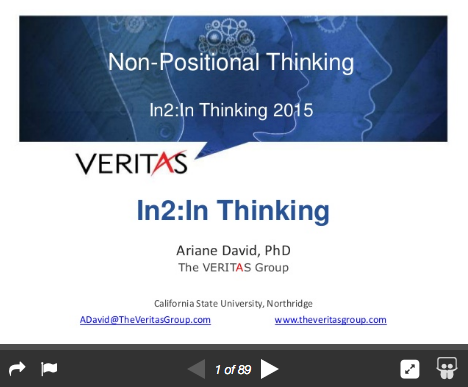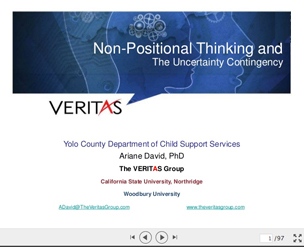The Tyranny Of Knowledge
The Tyranny of Knowledge
In2:InThinking Conference 2014
Aerojet Rocketdyne
Transcript: 6/20/14
DR. ARIANE DAVID: All right, so positional thinking, there are – here are some of the thinking errors that we see in organizations. One is the tyranny of knowledge and we have all experienced this.
“Why are we doing this?”
“Well I don’t know, we have just always done it. This is the way we do it.”
“Well I have a better way.”
“No. no. no. This is the way we do it, you have to do it this way.”
Tyranny of knowledge has plagued us throughout history.
In ancient Greece, there really was no codified body of knowledge. People taught what they experienced, and what they observed.
And the philosophers came along and they thought about things. And they thought and they said, “This must be what’s going on here.”
Then Aristotle came along. And Aristotle was literally the first know it all. He knew everything, and he wrote about literally everything.
And he wrote about it, with absolute certainty. And he wrote volumes, and the number of those volumes persisted through to the Middle Ages.
And were rediscovered by Europe in the Middle Ages in about the 11th century.
All of a sudden, imagine a society emerging from the Dark Ages, where Charlemagne didn’t know how to write.
So there was very little learning, except the practical learning of agriculture. And now, all of the sudden, these incredible works of Aristotle were brought to the west, mostly by Arab scholars.
And suddenly, there were books about everything. A book, “why there is wind”, “why we have sex”, “Why the planets do what they do”, “what is just”, “what is not just”.
Now the problem was that Aristotle meant well, but he was wrong most of time.
But this knowledge was taken in, and it was Baptized, you know, Aquinas had to make it fit into the message of the church.
But he did that quite successfully. And it was adopted and that’s what was taught for hundreds of years.
And if you did not teach Aristotle, you didn’t have students. You couldn’t teach in universities. Because that was the knowledge.
And when we have knowledge, when we know what’s going on, what happens? You don’t have to look.
You don’t have to look because you know. So there’s no experimentation. There’s no questioning.
In fact, the questioning finally took place really by the outliers of medieval society; Galileo, Copernicus, Descartes.
You know, they went outside of the church, they went outside of the social structure and finally did some experimentation.
Of course, it was Descartes who said, “If you would be a true seeker after truth, doubt everything in your life at least once.”
This was – this was revolutionary and could have gotten him burned at the stake, but he was very very clever.
And he said, “There are the things of God over here, and that’s everything. But then there are the things of man, science, and we can study the things of man.
We can’t study the things of God. We can only believe.” So he was able to successfully separate the world of the intellect from the world of the spirit.


